区别时态:(一般现在时、一般过去时、一般将来时)
一般现在时、现在进行时、一般过去时及一般将来时四种时态语言点归纳总结
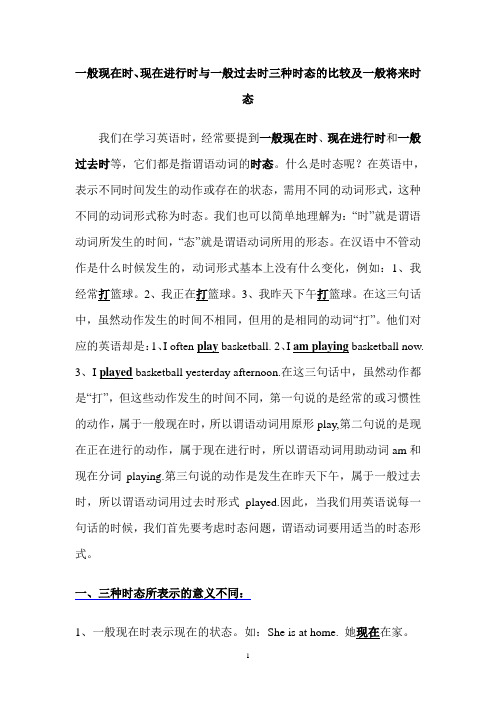
一般现在时、现在进行时与一般过去时三种时态的比较及一般将来时态我们在学习英语时,经常要提到一般现在时、现在进行时和一般过去时等,它们都是指谓语动词的时态。
什么是时态呢?在英语中,表示不同时间发生的动作或存在的状态,需用不同的动词形式,这种不同的动词形式称为时态。
我们也可以简单地理解为:“时”就是谓语动词所发生的时间,“态”就是谓语动词所用的形态。
在汉语中不管动作是什么时候发生的,动词形式基本上没有什么变化,例如:1、我经常打篮球。
2、我正在打篮球。
3、我昨天下午打篮球。
在这三句话中,虽然动作发生的时间不相同,但用的是相同的动词“打”。
他们对应的英语却是:1、I often play basketball. 2、I am playing basketball now.3、I played basketball yesterday afternoon.在这三句话中,虽然动作都是“打”,但这些动作发生的时间不同,第一句说的是经常的或习惯性的动作,属于一般现在时,所以谓语动词用原形play,第二句说的是现在正在进行的动作,属于现在进行时,所以谓语动词用助动词am和现在分词playing.第三句说的动作是发生在昨天下午,属于一般过去时,所以谓语动词用过去时形式played.因此,当我们用英语说每一句话的时候,我们首先要考虑时态问题,谓语动词要用适当的时态形式。
一、三种时态所表示的意义不同:1、一般现在时表示现在的状态。
如:She is at home. 她现在在家。
一般现在时也表示经常的或习惯性的动作。
如:He often plays basketball.他时常打篮球。
2、现在进行时表示现在进行时表示现在(说话瞬间)正在进行或发生的动作。
如:He is playing basketball now.他正在打篮球。
3、一般过去时表示表示过去某个时间存在的状态。
如:She was at home yesterday.她昨天在家。
(完整版)一般现在时、现在进行时、一般将来时、一般过去时四大时态讲解表格对比总结
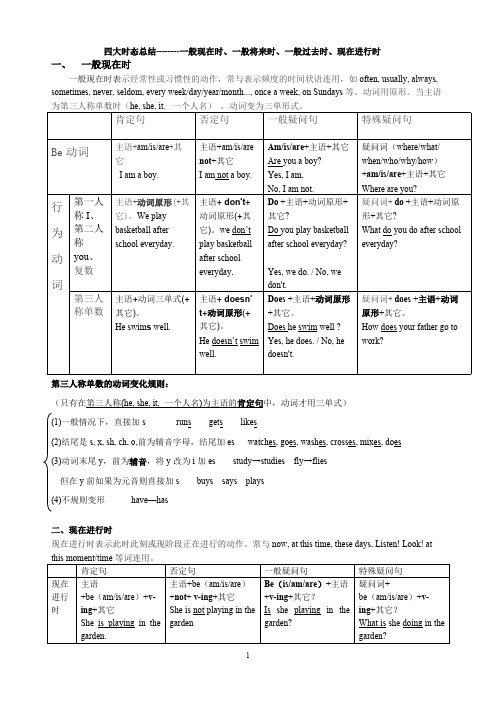
四大时态总结--------一般现在时、一般将来时、一般过去时、现在进行时一、一般现在时一般现在时表示经常性或习惯性的动作,常与表示频度的时间状语连用,如often, usually, always, sometimes, never, seldom, every week/day/year/month..., once a week, on Sundays等。
动词用原形。
当主语为第三人称单数时(he, she, it, 一个人名),动词变为三单形式。
肯定句否定句一般疑问句特殊疑问句Be动词主语+am/is/are+其它I am a boy.主语+am/is/arenot+其它I am not a boy.Am/is/are+主语+其它Are you a boy?Yes, I am.No, I am not.疑问词(where/what/when/who/why/how)+am/is/are+主语+其它Where are you?第一人称I、第二人称you、复数主语+动词原形(+其它)。
We playbasketball afterschool everyday.主语+ don't+动词原形(+其它)。
we don’tplay basketballafter schooleveryday.Do +主语+动词原形+其它?Do you play basketballafter school everyday?Yes, we do. / No, wedon't.疑问词+do +主语+动词原形+其它?What do you do after schooleveryday?行为动词第三人称单数主语+动词三单式(+其它)。
He swim s well.主语+ doesn’t+动词原形(+其它)。
He doesn’t swimwell.Does +主语+动词原形+其它。
Does he swim well ?Yes, he does. / No, hedoesn't.疑问词+ does +主语+动词原形+其它。
区别时态:一般现在时、一般过去时、一般将来时
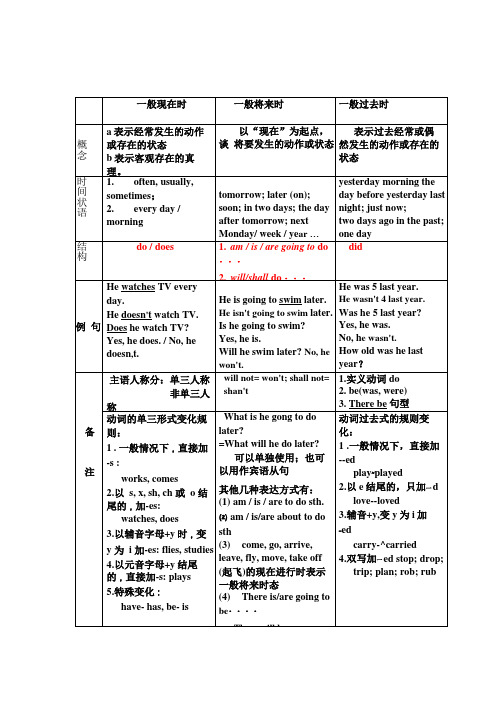
一般体三种时态综合练习:(一)1.____ he ______ to the park at 6:30 in the morning? No,he ______ .A. Does; goes; doesB. Does; go; doesn’tC. Does; go; does2.What colour ______ y ou ________ this bookcase? I ______ it pink.A. are; going to paint; am going to paintB. do; paint; paintC. did; paint; painted3.Tim always _______ a picture at home. He ________ a car now.A. draws; is drawingB. draw; drawC. draws; draw4.She usually ______ h er friends. They often ______ tea.A. see; drinkB. sees; drinksC. sees; drink5.He usually ____ the dishes at night, but tonight he ______ c lothes.A. wash; washB.washes; is going to washC. is washing; washes6.Mr. Green usually _______ h is newspaper in the evening, but he and his wife _______television yesterday evening.A.reads; watchesB.reads; is going to watchC.reads; watched7.Where are the man and the woman? They __________ near the tree.A. sitB. satC. are sitting8._____ your pen pal ______ d iving? No, he ________ .He _______ writing stories.A. Does; like; doesn’t; likesB. Does; likes; doesn’t; likeC. Do; like; don’t; likes9._____ you _____ fishing yesterday? No, we _________ .A. Does; go; doesn’tB. Did; go; didn’tC. Do; go; don’t10.Open the window, Please. Look! He ________ it.A. opensB. is openningC. is opening11.I usually ____ some milk every day. But I ________ coffee yesterday.A. drink; drankB. is drinking; drinkC. drank; am drinking12.Mr. Green often __ his newspapers at night. But he ___ an interesting book tonight.A. reads; readsB. reads; readC. reads; is going to read13.The old man _______ p laying sports in the park. He _______ m orning exercise now.A. likes; is doingB. likes; doesC. like; doing14.What ______ you usually _______ i n the evening? I ________ c omputer games.What ______ you ________ l ast night? I ____ a book.A. do; do; play; did; do; readB. did; do; played; do; do; readC. does; do; plays; do; do; am reading15.Where ________ the boy ______ ? He _______ across the river now.A. does; swim; swimsB. is; swimming; is swimmingC. is; swimming; is swimming16.____ you _______ to music now? Yes, we _______ .A. Do; listen; doB. Did; listen; didC. Are; listening; are17.Put on you coat, please. OK. I ___ it on.A. am puttingB. am going to putC. Put18.____ you _______ coffee? Yes, I ________ .A. Do; like; doB. Did; like; didC. Are; like; am19.Look! Two cats ________ across the wall.A. runB. runsC. are running20.She _____ tea, but he ___ .A. likes; doesn’t B; like; don’t C. like; doesn’t21.---How many ___________ in the tree? ---There are two.A. bird are therB. birds is therC. birds are thereD.birds are their1.1.Mr Johnson usually goes to the hospital __________ .A. by his carB. by the black carC. by carD. by the new car23.Does your brother play ping-pong ______________ ?A. on every afternoonB. every afternoonC. in every afternoonD. at every afternoon24.________ do you usually come to school?A. HowB. WhatC. WhichD. How much25.---Don’t you usually come to school by bike? --- _________ . But I sometimes walk.A. Yes, I doB. No, I don’tC. Yes, I doD. No, I don’t26.What ____ Tom and his mother like ?A. doesB. doC. isD. are27.What’s your hobby? My hobby is ____ model plane.A. makingB. makeC. makingD. made28.---Did you go to the park on Sunday morning? ---___, I went there in the afternoon.A. YesB. NoC. SureD. Sorry29.I don’t think he’s so great, but my mom _______ .A. doB. doesC. isD. are30.A kid ____ breakfast every morning, because it’s good for his health.A. have toB. has toC. has to haveD. has to has一般体三种时态综合练习:(二)1.Listen ! Someone ______ in the room.A. criedB. cryingC. is crying2.Could you tell me where the bus station _______ ?A. wasB. isC. be3.He often ______ his clothes on Sundays.A. washingB. washesC. wash1.1’m Chine se. Where ______ f rom?A. do you comeB. you are comingC. you comeD. are you coming5.Don’t talk so loudly . Your father ____ .A. sleepsB. is sleepingC. sleptst week John ________ his leg.A. brokenB. brokeC. breaks7.——Can I speak to Mr. Green?——I’m afraid not. He _________ a meeting at the moment.A. havingB. is havingC. hasD. had8.——What are the old men under the tree doing?——They __________________ happily.A. is chatingB. is chattingC. are chatingD. are chatting9.My father ________ the Party twenty years ago.A. joinB. joinsC. joinedD. will join10.Gina often __________ her homework in the evening. But at the moment this evening she ___________ T V.A. does; watchesB. is doing; is watchingC. does; is watchingD. is doing; watches11.He ___________ to school on Sundays.A. don’t goB. doesn’t goC. isn’t goD. not go12.He sometimes _____________ s ome novels on Sunday.A. seeB. readsC. watchesD. look13.My father ________ t o work at eight.A. usually goB. usually goesC. goes usuallyD. go usually14.Jenny ____ in an office. Her parents ______ in a hospital.A. work works B works workC. work are workingD. is working work15.He said the sun ____ in the east and ___ i n the west.A rose; setB rises; setsC rises; setD rise; sets16.Wang Mei _____ music and often _______ to music.A like; listenB likes; listensC like; are listeningD liking ; listen17.Jenny _____ English every evening.A has studyB studiesC studyD studied18.Every year many foreigners _____________ t o China to learn Chinese.A. have comeB. comesC. cameD. come19.——Where’s Susan, Mike?——She ____________ in the kitchen.A. cooksB. cookedC. is cooking 20.——What’s your brother doing in his room now?——He _______________ a kite. A. makes B. made C. is making D. will make21. Yesterday ,Tony’s family _________ a good time.A. hasB. haveC. hadD. haven’t 22.——Where’s the cake I made this morning? ——We _________ it, mum. Can you make another one for us?A. ateB. eatC. will itD. were eating23. Mary ______________ the piano well.A. playB. playsC. playingD. played24.Don’t turn off the radio. I ______ to the news. A. listen B. have listened C. listened D. am listening25. Don’t turn on the TV. Grandma __________ now. A. is sleeping B. will sleep C. slept D. sleeps26.——What are you doing, Cathy?——I’m ________ my cat. I can’t find it. A. looking for B. looking at C. looking up D. looking after 27.——What did you do after school yesterday?——I __________ basketball with my friends.A. playB. playedC. will playD. am playing28. ---Hi, Kate . You look tired. What’s the matter?---I _____ well last night.A. didn’t sleepB. don’t sleepC. haven’t sleptD. won’t sleep 29.Look!The twins their mother do the housework.(A)are wanting (B)help(C)are helping(A)is singing (B)sing (C)to sing (D)is sing37.The children ______ football.(D)are looking are the birds doing? They are singing in a tree. 30.(A)Who(B)What 31.Is she ______ something? (A)eat (B)eating 32 .你在干什么? (A)What is you doing? (C)What are you doing? 33 .What are you listening (A)/ (B)for 34 .我正在听他说话. (A)I listening to him. C)I'm listen to him. 35 .They are ______ their clothes.(A)makeing (B)putting 36 .Listen! She(C)How (D)Where (C)eatting(D)eats (B)What are you do?(D)What do you do?(C)at (D)to(B)I'm listening to him.(D)I'm listening him.(C)put away (D)putting on in the classroom.(A)is playing (B)are playing (C)play the (D)play 38.They are flying kites.(A)他们喜欢放风筝.(B)他们在放风筝吗?(。
一般现在过去将来时 四种时态
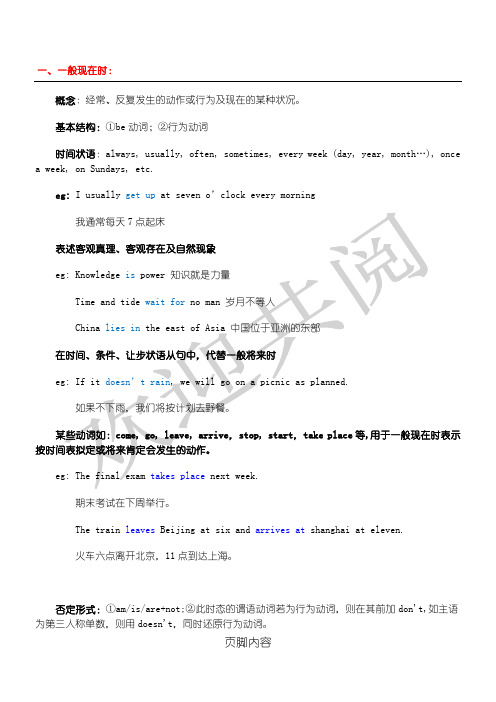
一、一般现在时:概念:经常、反复发生的动作或行为及现在的某种状况。
基本结构:①be动词;②行为动词时间状语:always, usually, often, sometimes, every week (day, year, month…), once a week, on Sundays, etc.eg: I usually get up at seven o’clock every morning期末考试在下周举行。
The train leaves Beijing at six and arrives at shanghai at eleven.火车六点离开北京,11点到达上海。
否定形式:①am/is/are+not;②此时态的谓语动词若为行为动词,则在其前加don't,如主语为第三人称单数,则用doesn't,同时还原行为动词。
一般疑问句:①把be动词放于句首;②用助动词do提问,如主语为第三人称单数,则用does,同时,还原行为动词。
二、一般过去时:概念:过去某个时间里发生的动作或状态;过去习惯性、经常性的动作、行为。
基本结构:①be动词;②行为动词时间状语:ago, yesterday, the day before yesterday, last week(year, night, month…), in 1989, just now, at the age of 5, one day, long long ago, once upon a time, etc.三、一般将来时:概念:表示从现在看来将要发生的动作或存在的状态及打算、计划或准备做某事。
时间状语:tomorrow, next day(week, month, year…),soon, in a few minutes, by…,the day after tomorrow, etc.四、过去将来时:概念:立足于过去某一时刻,从过去看将来要发生的动作或存在的状态,常用于宾语从句中。
区别时态:(一般现在时、一般过去时、一般将来时)

一般体三种时态区别:(一)一般体三种时态综合练习:(一)1. _____ he _____ to the park at 6:30 in the morning? No,he _____ .A. Does; goes; doesB. Does; go; doesn’tC. Does; go; does2. What colour _____ you _____ this bookcase? I _____ it pink.A. are; going to paint; am going to paintB. do; paint; paintC. did; paint; painted3. Tim always _____ a picture at home. He _____ a car now.A. draws; is drawingB. draw; drawC. draws; draw4. She usually _____ her friends. They often _____ tea.A. see; drinkB. sees; drinksC. sees; drink5. He usually _____ the dishes at night, but tonight he _____ clothes.A. wash; washB.washes; is going to washC. is washing; washes6. Mr. Green usually _____ his newspaper in the evening, but he and his wife _____ television yesterday evening.A.reads; watchesB.reads; is going to watchC.reads; watched7. Where are the man and the woman? They _____ near the tree.A. sitB. satC. are sitting8. _____ your pen pal _____ diving? No, he _____ .He ______ writing stories.A. D oes; like; doesn’t; likesB.Does; likes; doesn’t; likeC.Do; like; don’t;likes9. _____ you _____ fishing yesterday? No, we _____ .A. Does; go; doesn’tB. Did; go; didn’tC. Do; go; don’t10. Open the window, Please. Look! He _____ it.A. opensB. is openningC. is opening11. I usually _____ some milk every day. But I _____ coffee yesterday.A. drink; drankB. is drinking; drinkC. drank; am drinking12. Mr. Green often __ his newspapers at night. But he ___ an interesting booktonight.A. reads; readsB. reads; readC. reads; is going to read13. The old man _____ playing sports in the park. He _____ morning exercise now.A. likes; is doingB. likes; doesC. like; doing14. What _____ you usually _____ in the evening? I ______ computer games.What _____ you _____ last night? I _____ a book.A. do; do; play; did; do; readB. did; do; played; do; do; readC. does; do; plays; do; do; am reading15. Where ______ the boy _____ ? He _____ across the river now.A. does; swim; swimsB. is; swimming; is swimmingC. is; swimming; is swimming16. _____ you _____ to music now? Yes, we _____ .A. Do; listen; doB. Did; listen; didC. Are; listening; are17. Put on you coat, please. OK. I ___ it on.A. am puttingB. am going to putC. Put18. _____ you ______ coffee? Yes, I ______ .A. Do; like; doB. Did; like; didC. Are; like; am19. Look! Two cats ______ across the wall.A. runB. runsC. are running20. She ____ tea, but he ___ .A. likes; doesn’t B; like; don’t C. like; doesn’t21. ---How many ________ in the tree? ---There are two.A. bird are therB. birds is therC. birds are thereD.birds are their22.. Mr Johnson usually goes to the hospital ________.A. by his carB. by the black carC. by carD. by the new car23. Does your brother play ping-pong __________?A. on every afternoonB. every afternoonC. in every afternoonD. at every afternoon24. ________ do you usually come to school?A. HowB. WhatC. WhichD. How much25. ---Don’t you usually come to school by bike? ---_________. But I sometimes walk.A. Yes, I doB. No, I don’tC. Yes, I doD. No, I don’t26. What ____ Tom and his mother like ?A. doesB. doC. isD. are27. What’s your hobby? My hobby is ______ model plane.A. makingB. makeC. makingD. made28. ---Did you go to the park on Sunday morning? ---___, I went there in the afternoon.A. YesB. NoC. SureD. Sorry29. I don’t think he’s so great, but my mom _________.A. doB. doesC. isD. are30. A kid ______ breakfast every morning, because it’s good for his health.A. have toB. has toC. has to haveD. has to has一般体三种时态综合练习:(二)1.Listen ! Someone ______ in the room.A. criedB. cryingC. is crying2.Could you tell me where the bus station______?A. wasB. isC. be3.He often ______ his clothes on Sundays.A. washingB. washesC. wash4.I’m Chinese. Where ______ from?A. do you comeB. you are comingC. you comeD. are you coming5.Don’t talk so loudly . Your father ______.A. sleepsB. is sleepingC. sleptst week John ______ his leg.A. brokenB. brokeC. breaks7.——Can I speak to Mr. Green?——I’m afraid not. He __________a meeting at the moment.A. havingB. is havingC. hasD. had8.——What are the old men under the tree doing?——They ______________ happily.A. is chatingB. is chattingC. are chatingD. are chatting9. My father _______ the Party twenty years ago.A. joinB. joinsC. joinedD. will join10. Gina often ________her homework in the evening. But at the moment this evening she________ TV.A. does; watchesB. is doing; is watchingC. does; is watchingD. is doing; watches11. He _________ to school on Sundays.A. don’t goB. doesn’t goC. isn’t goD. not go12. He sometimes _________ some novels on Sunday.A. seeB. readsC. watchesD. look13. My father _______ to work at eight.A. usually goB. usually goesC. goes usuallyD. go usually14. Jenny ____ in an office. Her parents ____in a hospital.A. work works B works workC. work are workingD. is working work15. He said the sun ____in the east and ____in the west.A rose; setB rises; setsC rises; setD rise; sets16. Wang Mei ____ music and often ____ to music.A like; listenB likes; listensC like; are listeningD liking ; listen17. Jenny____ English every evening.A has studyB studiesC studyD studied18. Every year many foreigners _________to China to learn Chinese.A. have comeB. comesC. cameD. come19.——Where’s Susan, Mike?——She _________ in the kitchen.A. cooksB. cookedC. is cooking20.——What’s your brother doing in his room now?——He ____________ a kite.A. makesB. madeC. is makingD. will make21. Yesterday,Tony’s family _________ a good time.A. hasB. haveC. hadD. haven’t22.——Where’s t he cake I made this morning?——We _______ it, mum. Can you make another one for us?A. ateB. eatC. will itD. were eating23. Mary___________ the piano well.A. playB. playsC. playingD. played24. Don’t turn off the radio. I _______ to the news.A. listenB. have listenedC. listenedD. am listening25. Don’t turn on the TV. Grandma ____________ now.A. is sleepingB. will sleepC. sleptD. sleeps26.——What are you doing, Cathy?——I’m __________my cat.I can’t find it.A. looking forB. looking atC. looking upD. looking after27.——What did you do after school yesterday?——I _________basketball with my friends.A. playB. playedC. will playD. am playing28. ---Hi, Kate. You look tired. What’s the matter?---I ______well last night.A. didn’t sleepB. don’t sleepC. haven’t sleptD. won’t sleep29.Look!The twins_____their mother do the housework.(A)are wanting (B)help(C)are helping (D)are looking30._____are the birds doing? They are singing in a tree.(A)Who (B)What (C)How (D)Where31.Is she____something?(A)eat (B)eating (C)eatting (D)eats32.你在干什么?(A)What is you doing? (B)What are you do?(C)What are you doing? (D)What do you do?33.What are you listening_____?(A)/ (B)for (C)at (D)to34.我正在听他说话.(A)I listening to him. (B)I'm listening to him.C)I'm listen to him. (D)I'm listening him.35.They are_____their clothes.(A)makeing (B)putting (C)put away (D)putting on36.Listen! She____in the classroom.(A)is singing (B)sing (C)to sing (D)is sing37.The children_____football.(A)is playing (B)are playing (C)play the (D)play 38.They are flying kites.(A)他们喜欢放风筝. (B)他们在放风筝吗?(C)他们在放风筝. (D)他们常放风筝.39.Look,They are swimming in the river.I want_____you.(A)to go with (B)go with (C)helping (D)help40.Look.Lucy is_____a new bike today.(A)jumping (B)running (C)riding (D)takeing41. _____ you have a book?A. DoB. AreC. IsD. Have42. They _________ on a farm.A. workingB. is workC. workD. is worked43. Does Peter like to watch TV?__________.A. Yes, he likeB. No, he doesn’tC. Yes, he’d likeD. No, he likes44. She doesn’t __________ her homework in the afternoon.A. doingB. to doC. doesD. do45. How ____________ Mr. Brown ___________ to America?A. do,goB. is,goC. does,goD. does,goes46. Where’s my camera? I____________ it.A. am not findingB. am not seeingC. can’t findD. can’t look at47. How ___________ he go to work?He ___________ to work by bike.A. does ;goB. do;goesC. do ;goD. does;goes48. ______ you usually late for school?No, _____________.A. Do ; I amB. Does ;notC. Are ; I’m notD. Are ; I aren’t49. _____ she _____ home at six every day?A. Is , leaveB. Does , leaveC. Is , leavesD. Does , left50. Mr. Yang ____________ English this term.A. teaches ourB. teaches usC. teachs usD. teach our51. _____Mike from Japan?A. AreB. DoC. DoesD.Is52. _____you come from Japan?A. AreB. DoC. DoesD.Is53. What language do you_______?A. sayB. talkC. tellD. speak54. They ________ an English evening next Sunday.A. are havingB. are going to haveC. will havingD. is going to have55. ________ your brother ________ a magazine from the library?A. Are; going to borrowB. Is; going to borrowC. Will; borrowsD. Are; going to borrows56. _____ he _____ to the park at 6:30 in the morning? No, he ____.A. Does; goes; doesB. Does; go; doesn’tC. Does; go; does57. What colour _____ you _____ this bookcase? I _____ it pink.A. are; going to paint; am going to paintB. do; paint; paintC. did;paint; painted58. Tim always _____ a picture at home. He _____ a car now.A. draws; is drawingB. draw; drawC. draws; draw59. She usually _____ her friends. They often _____ tea.A. see; drinkB. sees; drinksC. sees; drink60. He usually _____ the dishes at night, but tonight he _____ clothes.A. wash; washB. washes; is going to washC. is washing; washes61. Mr. Green usually _____ his newspaper in the evening, but he and his wife _____ television yesterday evening.A. reads; watchesB. reads; is going to watchC. reads; watched62. Where are the man and the woman? They _____ near the tree. A. sit B. satC. are sitting63. _____ your pen pal _____ diving? No, he _____ .He ______ writing stories.A. Does; like; doesn’t; likes B.Does; likes; doesn’t; like C. Do; like; don’t; likes64. _____ you _____ fishing yesterday? No, we _____ .A. Does; go; doesn’tB. Did; go; didn’tC. Do; go; don’t65. Open the window, please. Look! He _____ itA. opensB. is openningC. is opening66. I usually _____ some milk every day. But I _____ coffee yesterday.A. drink; drankB. is drinking; drinkC. drank; am drinking67. Mr. Green often _____ his newspapers at night. But he _____ an interesting book tonight.A. reads; readsB. reads; readC. reads; is going to read68. The old man _____ playing sports in the park. He _____ morning exercise now.A. likes; is doingB. likes; doesC. like; doing69. What _____ you usually _____ in the evening? I ______ computer games.What _____ you _____ last night? I _____ a book.A. do; do; playB. did; do; playedC. does; do; playsdid; do; read do; do; read do; do; am reading70. Where ______ the boy _____? He _____ across the river now.A. does; swim; swims B. is; swimming; is swimmingC. is; swimming; is swimming71. _____ you _____ to music now? Yes, we _____. A. Do; listen; do B. Did; listen; did C. Are; listening; are72. Put on you coat, please. OK. I ______ it on.A. am puttingB. am going to putC. put73. _____ you ______ coffee? Yes, I ______.A. Do; like; doB. Did; like; didC. Are; like; am74. Look! Two cats ______ across the wall.A. runB. runsC. are running75. She _____ tea, but he _____.A. likes; doesn’t B; like; don’t C. like; doesn’t76. If it ________ tomorrow, we’ll go roller-skating.A. isn’t rainB. won’t rainC. doesn’t rainD. doesn’t fine77. Jenny ____ in an office. Her parents ____in a hospitalA work; worksB works; workC work; are workingD is working; work78. ----I don’t know if his uncle _____.---- I think he _____ if it doesn’t rain.A will come; comesB will come; will comeC comes; comesD comes; will come80. There _____ a meeting tomorrow afternoon.A. will be going toB. will going to beC. is going to be三、按要求变换句型。
七个时态:一般现在时、现在进行时、将来时:begoingto(=will)、一般过去时、过去进行时、过去完成时、现在

主要要一下七个时态:一般现在时、现在进行时、将来时:be goingto(= will )、一般过去时、过去进行时、过去完成时、现在完成进行时。
(1)一般现在时1.一般现在时表示经常或习惯性的动作,也可表示现在的状态或主语具备的性格和能力。
2.一般现在时中,没有be动词和情态动词,主语为第三人称单数的肯定句,动词要按规则加上s,主语是非第三人称单数的肯定句,动词用原形。
3.在一般现在时中,句中有be动词或情态动词时,否定句在be 动词和情态动词后加not,一般疑问句将be动词或情态动词放在句4.在一般现在时中,句中没有be动词或情态动词时,主语为第三人称单数的否定句在动词前加does+not (doesn’t),一般疑问句在句首加does,句子中原有动词用原形;主语为非第三人称单数,否定句用do+not (don’t),一般疑问句在句首加do,句子中动词用原形。
5.动词+s的变化规则1)一般情况下,直接加-s,如:cook-cooks, milk-milks2)以s. x. sh. ch. o结尾,加-es,如:guess-guesses,wash-washes,watch-watches, go-goes3)以“辅音字母+y”结尾,变y为i, 再加-es,如:study-studies6. 句中be动词和动词一般情况下只能有一种而且也必须有一种。
如:The childrenare very happy on Christmas Day .7.一般现在时中的be动词:一般用原形:am is aream用于第一人称单数(I);is用于第三人称单数(he she it和其他人名或称谓,如:Ben his sister等);are用于第二人称单数(you)和所有复数(包括第一人称复数we、第二人称复数you;第三人称复数they和其他复数,如his parents等)。
8.一般过去时中的动词:有两种情况:第一种情况:主语是第三人称单数(he she it 和其他,如Helen 、her cousin 等),动词后一般加s或es。
英语时态总结(现在、过去、将来)
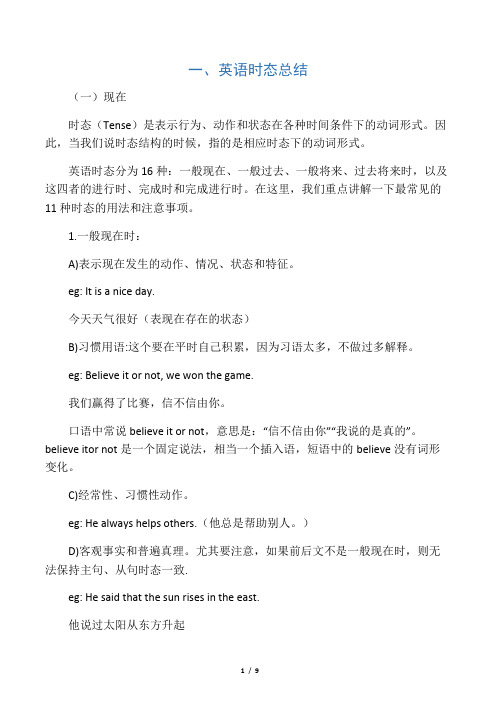
一、英语时态总结(一)现在时态(Tense)是表示行为、动作和状态在各种时间条件下的动词形式。
因此,当我们说时态结构的时候,指的是相应时态下的动词形式。
英语时态分为16种:一般现在、一般过去、一般将来、过去将来时,以及这四者的进行时、完成时和完成进行时。
在这里,我们重点讲解一下最常见的11种时态的用法和注意事项。
1.一般现在时:A)表示现在发生的动作、情况、状态和特征。
eg: It is a nice day.今天天气很好(表现在存在的状态)B)习惯用语:这个要在平时自己积累,因为习语太多,不做过多解释。
eg: Believe it or not, we won the game.我们赢得了比赛,信不信由你。
口语中常说believe it or not,意思是:“信不信由你”“我说的是真的”。
believe itor not是一个固定说法,相当一个插入语,短语中的believe没有词形变化。
C)经常性、习惯性动作。
eg: He always helps others.(他总是帮助别人。
)D)客观事实和普遍真理。
尤其要注意,如果前后文不是一般现在时,则无法保持主句、从句时态一致.eg: He said that the sun rises in the east.他说过太阳从东方升起这个句子要注意,前边虽然said是过去式,但是后边“太阳从东方升起”是个客观真理,故不需同前边一样用过去式,而用一般现在时。
总而言之,记住:客观事实无论谓语的时态是什么都用一般现在时。
E)表示一个按规定、计划或安排要发生的动作,(仅限于某些表示“来、去、动、停、开始、结束、继续”等的动词)可以与表示未来时间的状语搭配使用。
常见的用法是:飞机、火车、轮船、汽车等定期定点运行的交通方式。
eg: When does the plane leave?飞机什么时候起飞eg:The plane leaves at 3 o’clock this afternoon.飞机将在今下午三点起飞这个句子注意一下,飞机起飞本来是将来时,但为什么不用将来时,因为这里表示一个按规定、计划或安排要发生的动作,飞机起飞时间是规定、计划好了的。
英语十六种时态用法

英语十六种时态用法英语时态共有16种,分别是一般现在、一般过去、一般将来、过去将来时,以及这四者的进行时、完成时和完成进行时在不同的时态中,动词都会发生相应变化,时间状语的运用也会有所不同。
究竟怎样区分不同时态的用法呢?一起来看看吧!1. 一般现在时 simple present tense用法:A) 表示现在发生的动作、情况、状态和特征【例】My father is not home yet. 我父亲还没回家.She is astudent. 她是一个学生。
B) 经常性、习惯性动作,常与表示频度的副词连用,如always,often,seldom 等【例】He always eats an apple in the morning. 他常常在早上吃一个苹果。
C) 表示客观事实和普遍真理The earth movesaround the sun. 地球绕太阳转动。
D) 表示按计划安排好的,或将要发生的动作,可用一般现在表将来,但仅限于start, leave, go, arrive, begin等单词【例】The train leaves at 3:00 p.m.. 火车三点发车。
The show beginsin half an hour. 半小时后演出开始。
E) 在时间和条件状语从句中,主句是将来时,从句通常用一般现在(有时也用现在完成时)表示将来事情【例】I will go to bed when he comes back. 等他回来了我就去睡觉。
If you don'tstop the yelling, I will leave right now. 如果你还继续大吼大叫的话,我现在就走。
2. 现在进行时 present progressive tense用法:A) 表示说话时正在进行的动作【例】They are having lunch. 他们在吃饭。
B) 表示现阶段正在进行的动作【例】We are looking for a new house. 我们现在在找新房子。
简单的时态一般现在时一般过去时和将来时
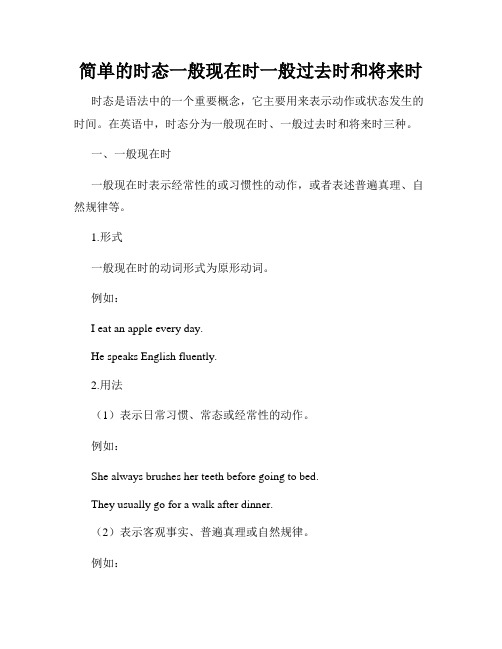
简单的时态一般现在时一般过去时和将来时时态是语法中的一个重要概念,它主要用来表示动作或状态发生的时间。
在英语中,时态分为一般现在时、一般过去时和将来时三种。
一、一般现在时一般现在时表示经常性的或习惯性的动作,或者表述普遍真理、自然规律等。
1.形式一般现在时的动词形式为原形动词。
例如:I eat an apple every day.He speaks English fluently.2.用法(1)表示日常习惯、常态或经常性的动作。
例如:She always brushes her teeth before going to bed.They usually go for a walk after dinner.(2)表示客观事实、普遍真理或自然规律。
例如:The sun rises in the east.Water boils at 100 degrees Celsius.(3)表示评论、观点或感受等。
例如:I think he is a talented musician.She looks beautiful in that dress.二、一般过去时一般过去时表示过去某个时间发生或完成的动作。
1.形式一般过去时的动词形式为动词的过去式。
例如:I studied English last night.He played basketball with his friends yesterday.2.用法(1)表示过去某个时间发生的动作。
例如:We visited the museum last week.She met her old friend at the party.(2)表示过去经常性的动作。
例如:He always ate breakfast at home when he was a child.(3)表示过去的习惯、惯常动作。
例如:Every morning, she woke up early and went jogging.三、将来时将来时表示将来某个时间发生或完成的动作。
时态与语态的区别
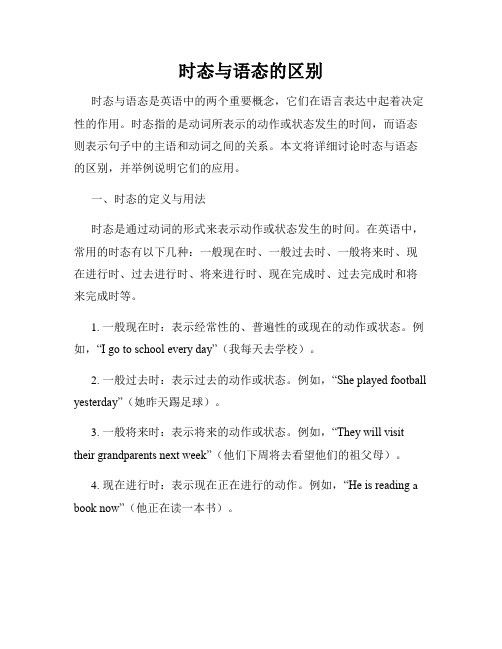
时态与语态的区别时态与语态是英语中的两个重要概念,它们在语言表达中起着决定性的作用。
时态指的是动词所表示的动作或状态发生的时间,而语态则表示句子中的主语和动词之间的关系。
本文将详细讨论时态与语态的区别,并举例说明它们的应用。
一、时态的定义与用法时态是通过动词的形式来表示动作或状态发生的时间。
在英语中,常用的时态有以下几种:一般现在时、一般过去时、一般将来时、现在进行时、过去进行时、将来进行时、现在完成时、过去完成时和将来完成时等。
1. 一般现在时:表示经常性的、普遍性的或现在的动作或状态。
例如,“I go to school every day”(我每天去学校)。
2. 一般过去时:表示过去的动作或状态。
例如,“She played football yesterday”(她昨天踢足球)。
3. 一般将来时:表示将来的动作或状态。
例如,“They will visit their grandparents next week”(他们下周将去看望他们的祖父母)。
4. 现在进行时:表示现在正在进行的动作。
例如,“He is reading a book now”(他正在读一本书)。
5. 过去进行时:表示过去某一时刻正在进行的动作。
例如,“They were playing basketball at 5 o'clock yesterday”(昨天五点钟他们正在打篮球)。
6. 将来进行时:表示将来某一时刻正在进行的动作。
例如,“We will be having a meeting at this time tomorrow”(明天这个时候我们将在开会)。
7. 现在完成时:表示过去某一时间开始,一直延续到现在的动作或状态。
例如,“I have studied English for ten years”(我已经学英语十年了)。
8. 过去完成时:表示在过去某一时间或动作之前已经完成的动作。
例如,“She had finished her homework before she went to bed”(她在睡觉前已经完成了她的家庭作业)。
英文最常用的时态有五个
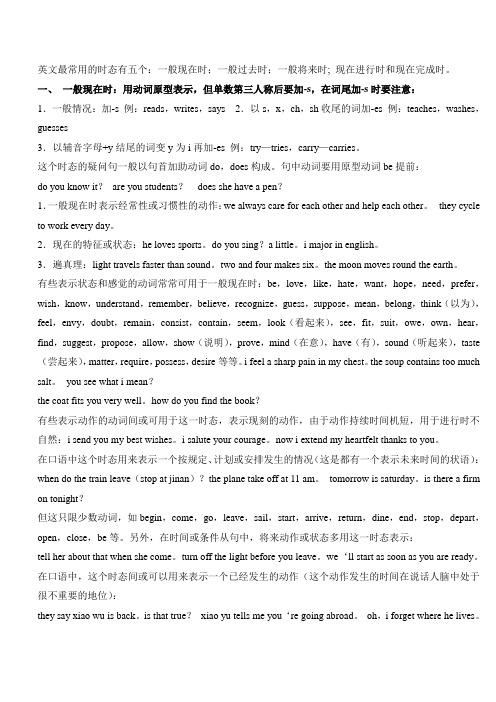
英文最常用的时态有五个:一般现在时;一般过去时;一般将来时; 现在进行时和现在完成时。
一、一般现在时:用动词原型表示,但单数第三人称后要加-s,在词尾加-s时要注意:1.一般情况:加-s 例:reads,writes,says 2.以s,x,ch,sh收尾的词加-es 例:teaches,washes,guesses3.以辅音字母+y结尾的词变y为i再加-es 例:try—tries,carry—carries。
这个时态的疑问句一般以句首加助动词do,does构成。
句中动词要用原型动词be提前:do you know it?are you students?does she have a pen?1.一般现在时表示经常性或习惯性的动作:we always care for each other and help each other。
they cycle to work every day。
2.现在的特征或状态:he loves sports。
do you sing?a little。
i major in english。
3.遍真理:light travels faster than sound。
two and four makes six。
the moon moves round the earth。
有些表示状态和感觉的动词常常可用于一般现在时:be,love,like,hate,want,hope,need,prefer,wish,know,understand,remember,believe,recognize,guess,suppose,mean,belong,think(以为),feel,envy,doubt,remain,consist,contain,seem,look(看起来),see,fit,suit,owe,own,hear,find,suggest,propose,allow,show(说明),prove,mind(在意),have(有),sound(听起来),taste (尝起来),matter,require,possess,desire等等。
一般现在时、 一般过去时与一般将来时的对比
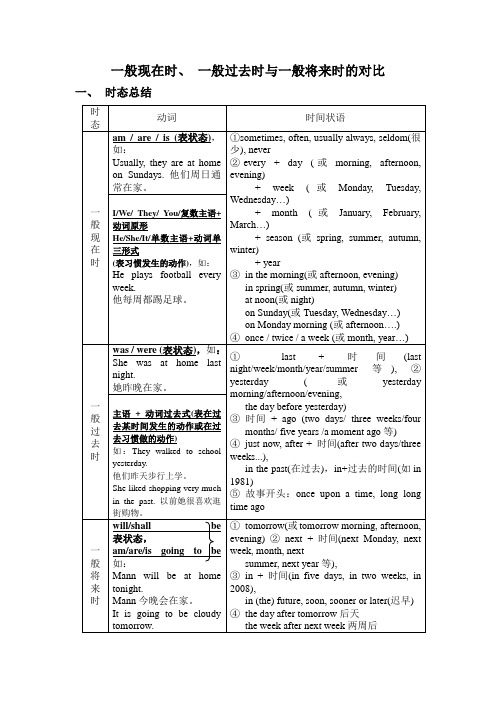
一般现在时、一般过去时与一般将来时的对比一、时态总结三.用动词的正确形式填空.1.I ______________ (be not) a middle school student. 2.Sam and I______________ (be) in different classes .3. ______________ you ______________ (have) a new watch?4. She______________ (make) a call to her parents once a week.5. It’s nine o’clock. It's time ______________ (play) games.6. I want ______________ (take) some books to the classroom.7. It's snowing now. We can go out and ______________ (play) in the snow.8. The men ______________ (work) near the house now.9. Look! The teachers ______________ (talk) to the students.10. It is true that the sun (rise) in the east and (fall) down in the west.11. I ______________ (leave) my jacket at your home just now.12. He______________ (be) born in 1982.13. Where ______________ your brother______________ (come) from?14. Bill ______________ (stay) at home every Sunday.15. I can ______________ (help) you to ______________ (carry) the things.16. Where ______________ you ______________ (go) tomorrow?17. Mike often______________ (read) English in the morning.He ______________ (like) ______________ (read) very much.18. ______________ they ______________ (speak) Japanese? Yes, they do.19. ______________ you ______________ (have) a good time at the cinema last night?20. There______________ (be) a meeting next week.21. Listen! Who ______________ (sing) next room?22. My father ______________ ( work) in the factory three years ago.23. He ______________ (not be) at school yesterday because he ______________ (be) ill.24. ______________ (be) there any water in the glass?25. He with his friends usually ______________ (play) football after school.四、根据首字母提示或所给中文完成下列句子:1.Don’t ______________ (打开) the door. It’s very cold.2.What are you ______________ (写), Betty?3.Guangzhou is one of the most modern(现代的) and beautiful ____________(城市) in China.4.__________ (课) Three is very hard. You must listen to the teacher _____________ (认真).5.They’re ______________ (来自) England.6.Tom is from______________ (美国) and he’s ______________ (美国人).7.What’s Jack’s ___________ _____________(姓)?8.Peter can talk a_____________ jobs in English.9.Sam and Betty b_____________ speak English.10.Linda can play basketball and r____________ a bike.11.My _____________(父母) take me to (拜访) my uncle every year.12.The tall _______________(建筑物) over there is the gym.13.Please ________________(欢迎) Betty and Tony to our school.14.My father is a teacher at Beijing ________________(国际的) school.五.用下面所给词的正确形式完成下列句子:be there behind dictionary some there bee-mail have got in one’s family make there be1. Are there __________________ maps on the wall in your classroom?2. _______________ many books in our school library.3. ________________ an English book on the teacher’s desk?4. The gym is ___________ the offices.5. Are there any __________________ in your bookshop?6. ___________________ any juice in the bottle?7. Here are some ______________ for you.8. Bill _________________ a small family.9. She has got eight people __________________.10. It’s eleven o’clock now. They ______________ kites. They’re going to fly kites next Saturday.六.阅读短文,从各题所给的A、B、C和D四个选项中,选出可以填入空白处的最佳答案。
如何区分英语时态

如何区分英语时态英语时态是学习英语的重点,可是如何区分英语时态却难倒了很多人。
下面是店铺为你整理的区分英语时态的方法,希望大家喜欢! 区分英语时态的方法英语时态分为16种:一般现在、一般过去、一般将来、过去将来时,以及这四者的进行时、完成时和完成进行时。
1. 一般现在时用法:A) 表示现在发生的动作、情况、状态和特征。
B) 习惯用语。
C) 经常性、习惯性动作。
例:He always helps others. (他总是帮助别人。
)D) 客观事实和普遍真理。
尤其要注意,如果前后文不是一般现在时,则无法保持主句、从句时态一致。
E) 表示一个按规定、计划或安排要发生的动作,(仅限于某些表示“来、去、动、停、开始、结束、继续”等的动词)可以与表示未来时间的状语搭配使用。
常见的用法是:飞机、火车、轮船、汽车等定期定点运行的交通方式。
How often does this shuttle bus run? (这班车多久一趟?)F) 在时间和条件状语从句里经常用一般现在(有时也用现在完成时)表示将来事情。
例:When you have finished the report, I will have waited for about 3 hours.(等你完成这份报告的时候,我就已经等了将近3个小时了。
)2. 现在进行时(be doing)用法:现在正在进行的动作。
3. 现在完成时(have done)用法:A) 表示动作到现在为止已经完成或刚刚完成。
B) 表示从过去某时刻开始,持续到现在的动作或情况,并且有可能会继续延续下去。
此时经常用延续性动词。
时间状语常用since加一个过去的时间点,或for加一段时间,或by加一个现在时间。
注意事项A) 现在完成时是联系过去和现在的纽带。
现在完成时和过去时的区别在于:现在完成时强调动作的动态,或受动态的影响,是动态的结果,对现在有影响;过去时只表示过去的某个具体时间里发生的动作,与现在没有联系。
七个时态
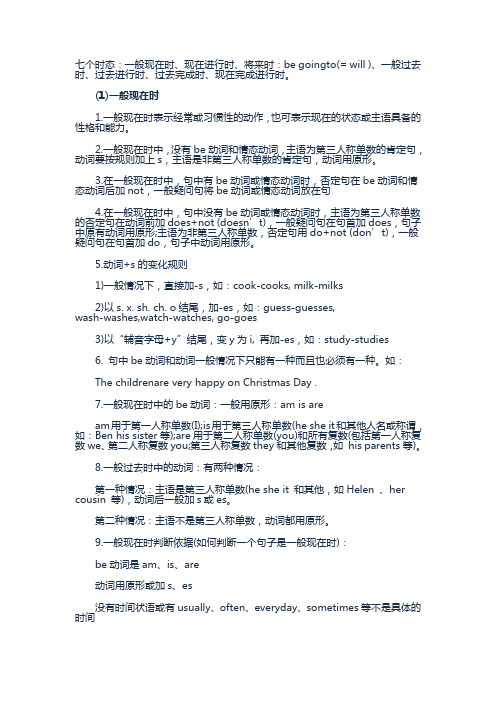
七个时态:一般现在时、现在进行时、将来时:be goingto(= will )、一般过去时、过去进行时、过去完成时、现在完成进行时。
(1)一般现在时1.一般现在时表示经常或习惯性的动作,也可表示现在的状态或主语具备的性格和能力。
2.一般现在时中,没有be动词和情态动词,主语为第三人称单数的肯定句,动词要按规则加上s,主语是非第三人称单数的肯定句,动词用原形。
3.在一般现在时中,句中有be动词或情态动词时,否定句在be动词和情态动词后加not,一般疑问句将be动词或情态动词放在句4.在一般现在时中,句中没有be动词或情态动词时,主语为第三人称单数的否定句在动词前加does+not (doesn’t),一般疑问句在句首加does,句子中原有动词用原形;主语为非第三人称单数,否定句用do+not (don’t),一般疑问句在句首加do,句子中动词用原形。
5.动词+s的变化规则1)一般情况下,直接加-s,如:cook-cooks, milk-milks2)以s. x. sh. ch. o结尾,加-es,如:guess-guesses,wash-washes,watch-watches, go-goes3)以“辅音字母+y”结尾,变y为i, 再加-es,如:study-studies6. 句中be动词和动词一般情况下只能有一种而且也必须有一种。
如:The childrenare very happy on Christmas Day .7.一般现在时中的be动词:一般用原形:am is aream用于第一人称单数(I);is用于第三人称单数(he she it和其他人名或称谓,如:Ben his sister等);are用于第二人称单数(you)和所有复数(包括第一人称复数we、第二人称复数you;第三人称复数they和其他复数,如his parents等)。
8.一般过去时中的动词:有两种情况:第一种情况:主语是第三人称单数(he she it 和其他,如Helen 、her cousin 等),动词后一般加s或es。
初中英语语法:一般现在时、一般过去时和一般将来时
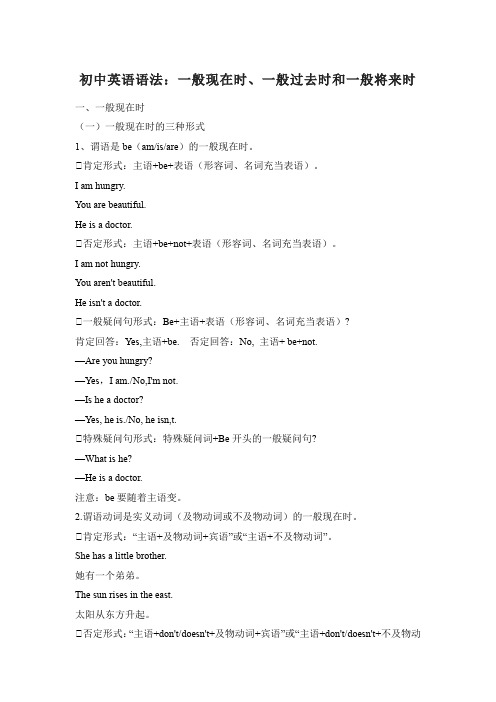
初中英语语法:一般现在时、一般过去时和一般将来时一、一般现在时(一)一般现在时的三种形式1、谓语是be(am/is/are)的一般现在时。
①肯定形式:主语+be+表语(形容词、名词充当表语)。
I am hungry.You are beautiful.He is a doctor.①否定形式:主语+be+not+表语(形容词、名词充当表语)。
I am not hungry.You aren't beautiful.He isn't a doctor.①一般疑问句形式:Be+主语+表语(形容词、名词充当表语)?肯定回答:Yes,主语+be. 否定回答:No, 主语+ be+not.—Are you hungry?—Yes,I am./No,I'm not.—Is he a doctor?—Yes, he is./No, he isn,t.①特殊疑问句形式:特殊疑问词+Be开头的一般疑问句?—What is he?—He is a doctor.注意:be要随着主语变。
2.谓语动词是实义动词(及物动词或不及物动词)的一般现在时。
①肯定形式:“主语+及物动词+宾语”或“主语+不及物动词”。
She has a little brother.她有一个弟弟。
The sun rises in the east.太阳从东方升起。
①否定形式:“主语+don't/doesn't+及物动词+宾语”或“主语+don't/doesn't+不及物动词”。
She doesn't have a little brother.她没有弟弟。
I don't eat every morning.我每天早晨都不吃饭。
①一般疑问句形式:“Do/Does+主语+及物动词原形+宾语”或“Do/Does+主语+不及物动词原形”。
肯定回答:Yes,主语+do/does. 否定回答是:No, 主语+ don't/doesn't.—Do you eat every morning?—Yes, I do./No, I don't.—Does she have a little brother?—Yes, she does./No, she doesn't.①特殊疑问句:特殊疑问词+do/does开头的一般疑问句?What do you like?When do you go to school?注意:根据主语确定用do还是does。
动词时态变化规则

动词时态变化规则时态是语法中一个重要的概念,它用来表示动作或状态发生的时间。
在英语中,动词时态的变化规则较为复杂,涉及到不同的时态形式和时态动词的变化。
本文将介绍一些常见的动词时态变化规则,帮助读者更好地理解和运用英语时态。
一、一般现在时(Simple Present)一般现在时用来表示经常性、习惯性或普遍性的动作或状态。
动词在第三人称单数形式下要加 -s 或 -es 结尾。
1. 主语为第一、二人称或复数形式时,动词不做任何变化。
例:I love playing basketball.例:They often go hiking on weekends.2. 主语为第三人称单数形式时,动词要加 -s 或 -es 结尾。
例:She likes to read novels.例:The dog barks at strangers.3. 特殊情况:- 动词以 -sh、-ch、-s、-x 或 -o 结尾,时态变化规则为动词 + -es。
例:He watches TV every evening.例:My father fixes the car himself.- 动词以辅音字母 + y 结尾,将 y 改为 i,加 -es。
例:She studies hard for the exam.例:He tries his best to solve the problem.二、一般过去时(Simple Past)一般过去时用来表示过去发生的动作或状态。
一般过去时的动词大部分是在动词原形末尾加 -ed。
不规则动词有自己的过去时形式。
1. 动词以辅音字母 + y 结尾,将 y 改为 i,加 -ed。
例:He studied English literature in university.例:They carried the heavy boxes into the truck.2. 动词以 -e 结尾,直接加 -d。
一般现在时、一般过去时、一般将来时、现在进行时
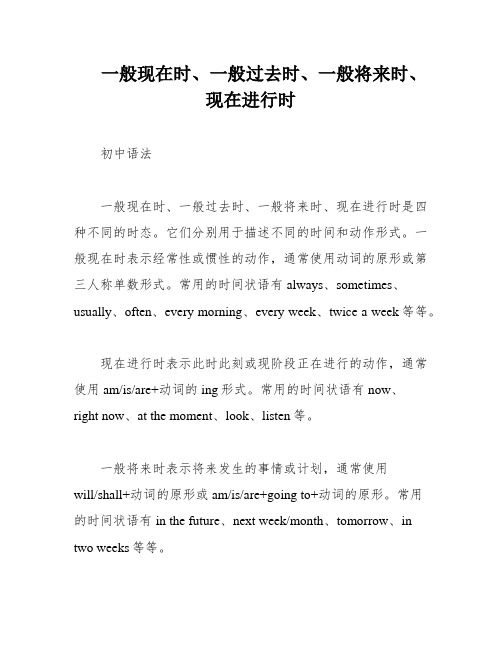
一般现在时、一般过去时、一般将来时、现在进行时初中语法一般现在时、一般过去时、一般将来时、现在进行时是四种不同的时态。
它们分别用于描述不同的时间和动作形式。
一般现在时表示经常性或惯性的动作,通常使用动词的原形或第三人称单数形式。
常用的时间状语有always、sometimes、usually、often、every morning、every week、twice a week等等。
现在进行时表示此时此刻或现阶段正在进行的动作,通常使用am/is/are+动词的ing形式。
常用的时间状语有now、right now、at the moment、look、listen等。
一般将来时表示将来发生的事情或计划,通常使用will/shall+动词的原形或am/is/are+going to+动词的原形。
常用的时间状语有in the future、next week/month、tomorrow、in two weeks等等。
一般过去时表示过去某一时刻或过去某一段时间所发生的动作,与现在无关。
动词的变化规则有以下几种:1)大多数动词在词尾加“S”;2)以辅音字母加“y”结尾的,要先将“y”变为“i”,然后在加“es”;3)以“s。
x。
ch。
sh”结尾的,在词尾加“es”;4)以“o”结尾的动词,加“es”。
现在进行时使用动词的ing形式,变化规则有以下几种:1)一般动词直接在词尾+ing;2)以不发音e结尾的动词,先去e再加ing;3)以重读闭音节结尾且末尾只有一个辅音字母的动词,双写末尾字母,再加ing。
3、一般过去时——动词的变化规则一般过去时是描述过去发生的事情,动词的变化规则如下:1)一般在动词后加-ed。
如:play-played。
offer-offered。
weigh-weighed。
destroy-destroyed。
sign-signed2)在以字母e结尾的动词后,只加-d。
如:like-liked。
- 1、下载文档前请自行甄别文档内容的完整性,平台不提供额外的编辑、内容补充、找答案等附加服务。
- 2、"仅部分预览"的文档,不可在线预览部分如存在完整性等问题,可反馈申请退款(可完整预览的文档不适用该条件!)。
- 3、如文档侵犯您的权益,请联系客服反馈,我们会尽快为您处理(人工客服工作时间:9:00-18:30)。
一般体三种时态区别:(一)一般体三种时态综合练习:(一)1. _____ he _____ to the park at 6:30 in the morning No,he _____ .A. Does; goes; doesB. Does; go; doesn’tC. Does; go; does2. What colour _____ you _____ this bookcase I _____ it pink.A.?are; going to paint; am going to paintB.?do; paint; paintC.?did; paint;painted?3. Tim always _____ a picture at home. He _____ a car now.A. draws; is drawingB. draw; drawC. draws; draw4. She usually _____ her friends. They often _____ tea.A. see; drinkB. sees; drinksC. sees; drink5. He usually _____ the dishes at night, but tonight he _____ clothes.A. wash; washB.washes; is going to washC. is washing; washes6. Mr. Green usually _____ his newspaper in the evening, but he and his wife _____ television yesterday evening.A.reads; watchesB.reads; is going to watchC.reads; watched7. Where are the man and the woman They _____ near the tree.A. sitB. satC. are sitting8. _____ your pen pal _____ diving No, he _____ .He ______ writing stories.A.?Does; like; doesn’t; likesB.?Does; likes; doesn’t; likeC.?Do; like; don’t;likes9. _____ you _____ fishing yesterday No, we _____ .A. Does; go; doesn’tB. Did; go; didn’tC. Do; go; don’t10. Open the window, Please. Look! He _____ it.A. opensB. is openningC. is opening11. I usually _____ some milk every day. But I _____ coffee yesterday.A. drink; drankB. is drinking; drinkC. drank; am drinking12. Mr. Green often __ his newspapers at night. But he ___ an interesting booktonight.A. reads; readsB. reads; readC. reads; is going to read13. The old man _____ playing sports in the park. He _____ morning exercise now.A. likes; is doingB. likes; doesC. like; doing14. What _____ you usually _____ in the evening I ______ computer games.What _____ you _____ last night I _____ a book.A. do; do; play; did; do; readB. did; do; played; do; do; readC. does; do; plays; do; do; am reading15. Where ______ the boy _____ He _____ across the river now.A. does; swim; swimsB. is; swimming; is swimmingC.?is; swimming; is swimming16. _____ you _____ to music now Yes, we _____ .A. Do; listen; doB. Did; listen; didC. Are; listening; are17. Put on you coat, please. OK. I ___ it on.A. am puttingB. am going to putC. Put18. _____ you ______ coffee Yes, I ______ .A. Do; like; doB. Did; like; didC. Are; like; am19. Look! Two cats ______ across the wall.A. runB. runsC. are running20. She ____ tea, but he ___ .A. likes; doesn’t B; like; don’t C. like; doesn’t21. ---How many ________ in the tree ---There are two.A. bird are therB. birds is therC. birds are thereD.birds are their22.. Mr Johnson usually goes to the hospital ________.A. by his carB. by the black carC. by carD. by the new car23. Does your brother play ping-pong __________A. on every afternoonB. every afternoonC. in every afternoonD. at every afternoon24. ________ do you usually come to schoolA. HowB. WhatC. WhichD. How much25. ---Don’t you usually come to school by bike ---_________. But I sometimes walk.A. Yes, I doB. No, I don’tC. Yes, I doD. No, I don’t26. What ____ Tom and his mother likeA. doesB. doC. isD. are27. What’s your hobby My hobby is ______ model plane.A. makingB. makeC. makingD. made28. ---Did you go to the park on Sunday morning ---___, I went there in the afternoon.A. YesB. NoC. SureD. Sorry29. I don’t think he’s so great, but my mom _________.A. doB. doesC. isD. are30. A kid ______ breakfast every morning, because it’s good for his health.A. have toB. has toC. has to haveD. has to has一般体三种时态综合练习:(二)1.Listen ! Someone ______ in the room.A. criedB. cryingC. is crying2.Could you tell me where the bus station______A. wasB. isC. be3.He often ______ his clothes on Sundays.A. washingB. washesC. wash4.I’m Chinese. Where ______ fromA. do you comeB. you are comingC. you comeD. are you coming5.Don’t talk so loudly . Your father ______.A. sleepsB. is sleepingC. sleptst week John ______ his leg.A. brokenB. brokeC. breaks7.——Can I speak to Mr. Green——I’m afraid not. He __________a meeting at the mome nt.A. havingB. is havingC. hasD. had8.——What are the old men under the tree doing——They ______________ happily.A. is chatingB. is chattingC. are chatingD. are chatting9. My father _______ the Party twenty years ago.A. joinB. joinsC. joinedD. will join10. Gina often ________her homework in the evening. But at the moment this evening she________ TV.A. does; watchesB. is doing; is watchingC. does; is watchingD. is doing; watches11. He _________ to school on Sundays.A. don’t goB. doesn’t goC. isn’t goD. not go12. He sometimes _________ some novels on Sunday.A. seeB. readsC. watchesD. look13. My father _______ to work at eight.A. usually goB. usually goesC. goes usuallyD. go usually14. Jenny ____ in an office. Her parents ____in a hospital.A. work works B works workC. work are workingD. is working work15. He said the sun ____in the east and ____in the west.A rose; setB rises; setsC rises; setD rise; sets16. Wang Mei ____ music and often ____ to music.A like; listenB likes; listensC like; are listeningD liking ; listen17. Jenny____ English every evening.A has studyB studiesC studyD studied18. Every year many foreigners _________to China to learn Chinese.A. have comeB. comesC. cameD. come19.——Where’s Susan, Mike——She _________ in the kitchen.A. cooksB. cookedC. is cooking20.——What’s your brother doing in his room now——He ____________ a kite.A. makesB. madeC. is makingD. will make21. Yesterday,Tony’s family _________ a good time.A. hasB. haveC. hadD. haven’t22.——Where’s the cake I made this morning——We _______ it, mum. Can you make another one for usA. ateB. eatC. will itD. were eating23. Mary___________ the piano well.A. playB. playsC. playingD. played24. Don’t turn off the radio. I _______ to the news.A. listenB. have listenedC. listenedD. am listening25. Don’t turn on the TV. Grandma ____________ now.A. is sleepingB. will sleepC. sleptD. sleeps26.——What are you doing, Cathy——I’m __________my cat. I can’t find it.A. looking forB. looking atC. looking upD. looking after27.——What did you do after school yesterday——I _________basketball with my friends.A. playB. playedC. will playD. am playing28. ---Hi, Kate. You look tired. What’s the matter---I ______well last night.A. didn’t sleepB. don’t sleepC. haven’t sleptD. won’t sleep29.Look!The twins_____their mother do the housework.(A)are wanting (B)help(C)are helping (D)are looking30._____are the birds doing They are singing in a tree.(A)Who (B)What (C)How (D)Where31.Is she____something(A)eat (B)eating (C)eatting (D)eats32.你在干什么(A)What is you doing (B)What are you do(C)What are you doing (D)What do you do33.What are you listening_____(A)/ (B)for (C)at (D)to34.我正在听他说话.(A)I listening to him. (B)I'm listening to him.C)I'm listen to him. (D)I'm listening him.35.They are_____their clothes.(A)makeing (B)putting (C)put away (D)putting on36.Listen! She____in the classroom.(A)is singing (B)sing (C)to sing (D)is sing37.The children_____football.(A)is playing (B)are playing (C)play the (D)play 38.They are flying kites.(A)他们喜欢放风筝. (B)他们在放风筝吗(C)他们在放风筝. (D)他们常放风筝.39.Look,They are swimming in the river.I want_____you.(A)to go with (B)go with (C)helping (D)help(A)jumping (B)running (C)riding (D)takeing41. _____ you have a bookA. DoB. AreC. IsD. Have42. They _________ on a farm.A. workingB. is workC. workD. is worked43. Does Peter like to watch TV__________.A. Yes, he likeB. No, he doesn’tC. Yes, he’d likeD. No, he likes44. She doesn’t __________ her homework in the afternoon.A. doingB. to doC. doesD. do45. How ____________ Mr. Brown ___________ to AmericaA. do,goB. is,goC. does,goD. does,goes46. Where’s my camera I____________ it.A. am not findingB. am not seeingC. can’t findD. can’t look at47. How ___________ he go to workHe ___________ to work by bike.A. does ;goB. do;goesC. do ;goD. does;goes48. ______ you usually late for schoolNo, _____________.A. Do ; I amB. Does ;notC. Are ; I’m notD. Are ; I aren’t49. _____ she _____ home at six every dayA. Is , leaveB. Does , leaveC. Is , leavesD. Does , left50. Mr. Yang ____________ English this term.A. teaches ourB. teaches usC. teachs usD. teach our51. _____Mike from JapanA. Are?B. Do?C. Does?D.Is52. _____you come from JapanA. Are?B. Do?C. Does?D.Is53. What language do you_______?A. sayB. talkC. tellD. speak54. They ________ an English evening next Sunday.A. are having???B. are going to haveC. will having???D. is going to have55. ________ your brother ________ a magazine from the libraryA. Are; going to borrow???B. Is; going to borrowC. Will; borrows???D. Are; going to borrows56. _____ he _____ to the park at 6:30 in the morning No, he ____.A. Does; goes; doesB. Does; go; doesn’tC. Does; go; does57. What colour _____ you _____ this bookcase I _____ it pink.A.?are; going to paint; am going to paintB.?do; paint; paintC.?did;paint; painted?58. Tim always _____ a picture at home. He _____ a car now.A. draws; is drawingB. draw; drawC. draws; draw59. She usually _____ her friends. They often _____ tea.A. see; drinkB. sees; drinksC. sees; drink60. He usually _____ the dishes at night, but tonight he _____ clothes.A. wash; washB. washes; is going to washC. is washing; washes61. Mr. Green usually _____ his newspaper in the evening, but he and his wife _____ television yesterday evening.A. reads; watchesB. reads; is going to watchC. reads; watched62. Where are the man and the woman They _____ near the tree. A. sit B. satC. are sitting63. _____ your pen pal _____ diving No, he _____ .He ______ writing stories.A. Does; like; doesn’t; likes B.?Does; likes; doesn’t; like C. Do; like; don’t; likes64. _____ you _____ fishing yesterday No, we _____ .A. Does; go; doesn’tB. Did; go; didn’tC. Do; go; don’t65. Open the window, please. Look! He _____ itA. opensB. is openningC. is opening66. I usually _____ some milk every day. But I _____ coffee yesterday.A. drink; drankB. is drinking; drinkC. drank; am drinking67. Mr. Green often _____ his newspapers at night. But he _____ an interesting book tonight.A. reads; readsB. reads; readC. reads; is going to read68. The old man _____ playing sports in the park. He _____ morning exercise now.A. likes; is doingB. likes; doesC. like; doing69. What _____ you usually _____ in the evening I ______ computer games.What _____ you _____ last night I _____ a book.A. do; do; playB. did; do; playedC. does; do; playsdid; do; read do; do; read do; do; am reading70. Where ______ the boy _____ He _____ across the river now.A. does; swim; swims B. is; swimming; is swimmingC.?is; swimming; is swimming71. _____ you _____ to music now Yes, we _____. A. Do; listen; do B. Did; listen; did C. Are; listening; are72. Put on you coat, please. OK. I ______ it on.A. am puttingB. am going to putC. put73. _____ you ______ coffee Yes, I ______.A. Do; like; doB. Did; like; didC. Are; like; am74. Look! Two cats ______ across the wall.A. runB. runsC. are running75. She _____ tea, but he _____.A. likes; doesn’t B; like; don’t C. like; doesn’t76. If it ________ tomorrow, we’ll go roller-skating.A. isn’t rain?B. won’t rainC. doesn’t rain?D. doesn’t fine77. Jenny ____ in an office. Her parents ____in a hospitalA work; worksB works; work?C?work; are working?D is working; work78. ----I don’t know if his uncle _____.---- I think he _____ if it doesn’t rain.A will come; comesB will come; will come?C comes; comes??D comes; will come80. There _____ a meeting tomorrow afternoon.A. will be going to?B. will going to beC. is going to be?三、按要求变换句型。
